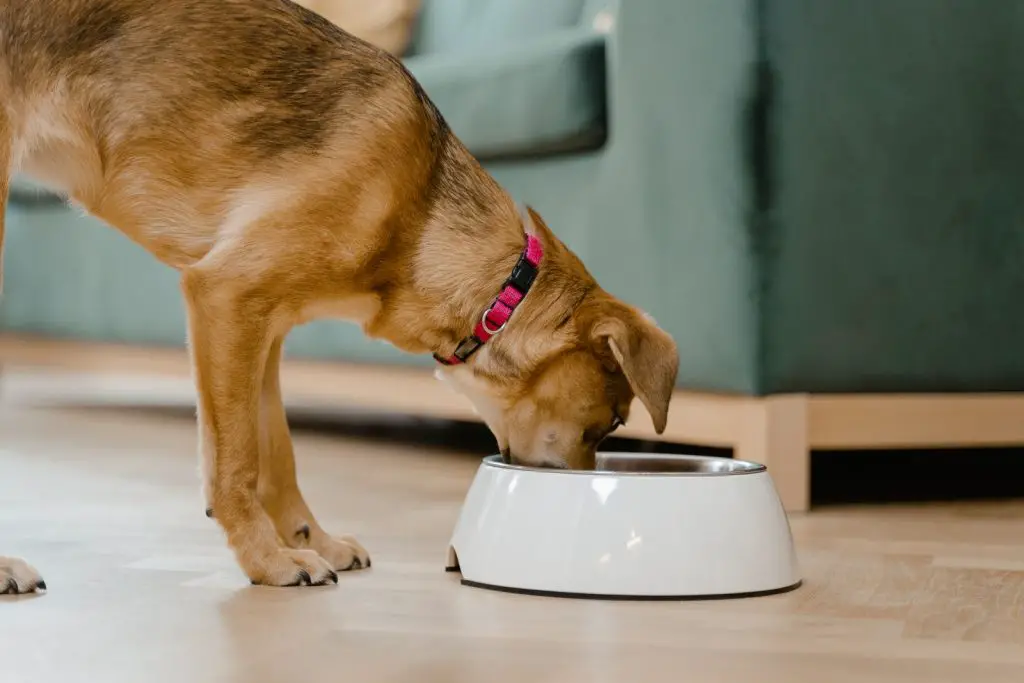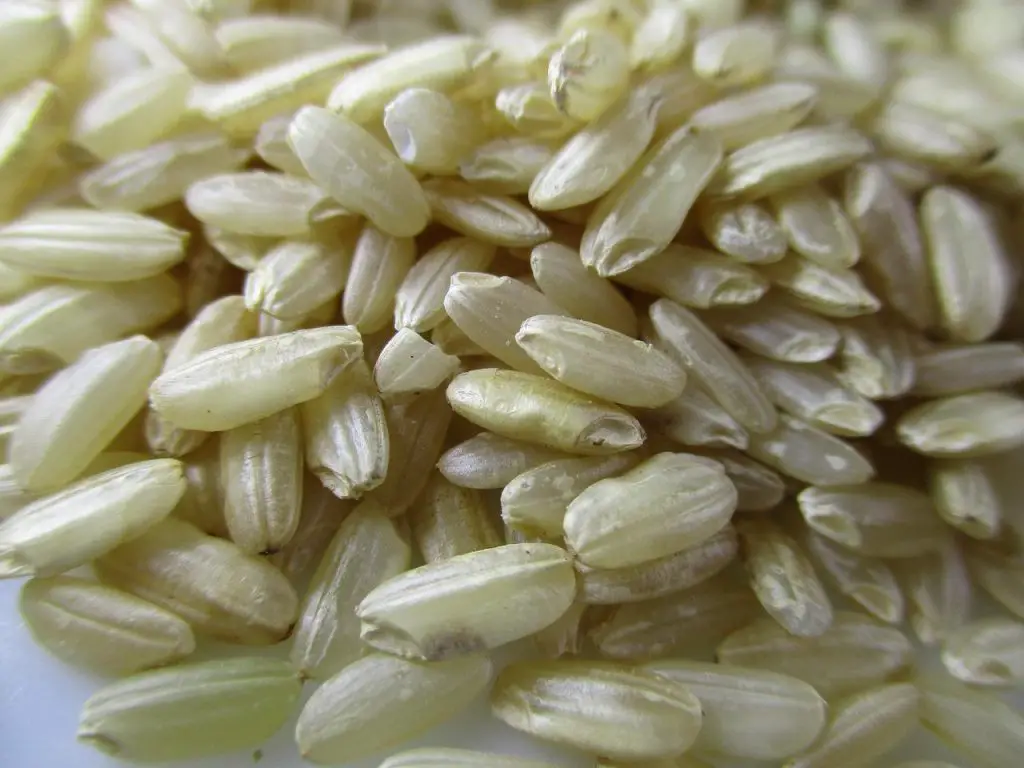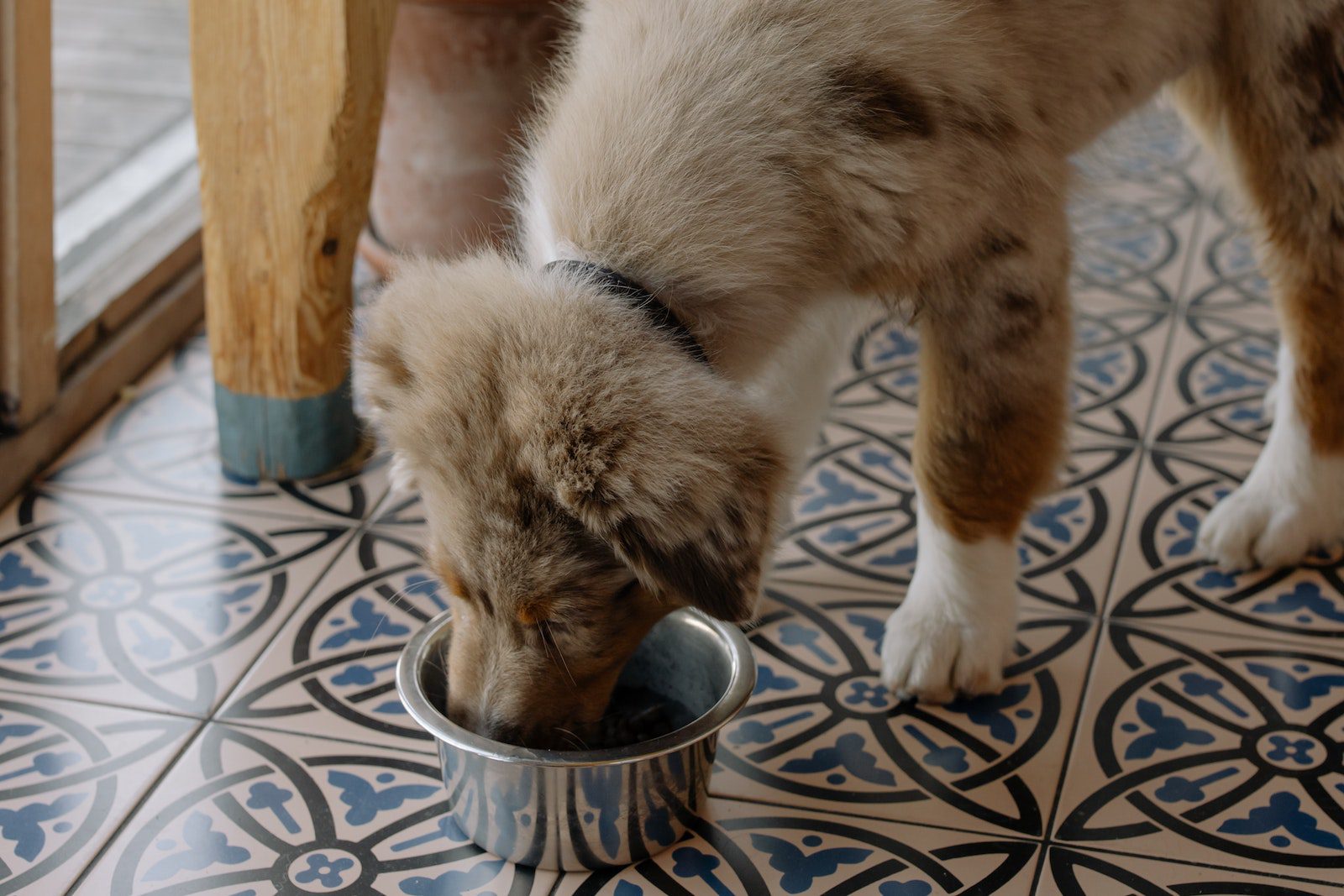Sure, brown rice is a great little grain that works wonders for our human bodies, but can we feed it to our canine companions? In short, the answer is YES, and we’re here to give you the low-down on what’s so special about brown rice, as well as explain why you should definitely add it to your pup’s diet.
Pet parents, you’ll want to carefully read through this entire article because we’ve amassed quite a bit of vital information. Even though there’s lots to learn, don’t worry, we’ve compiled all that info into this neatly-written, light-hearted post, complete with adorable pictures of fluffy, four-legged friends. So, come along with us on this exciting epicurean expedition, and find out the (not so) shocking truth about… BROWN RICE!
[Stay Informed – Discounted Dog food with Brown Rice]

The Nutritional Profile of Brown Rice
Look, I know what you’re thinking… “What’s so special about brown rice, anyway?”
Firstly, if you’re convinced that rice is all the same in the end, no matter the color, you’re one of the many people who are under a grave misconception. We’ll get into the differences between white and brown rice in the next section, but right now, let’s check out these key points before we explore the nutritional profile of this darker, less-refined grain.
Key Points About Brown Rice For Dogs:
- High in carbohydrates
- Great for dogs BUT too much can prove harmful
- Improper source of protein and fat
Brown rice is high in carbohydrates. So much so that too many carbs from this grain, on a daily basis, could prove harmful to your dog. Mainly, this is due to how canines consume energy. You see, humans rely on many food sources to fulfil their daily energy requirements, carbs being one of them. However, dogs are different, and they get most of their energy from protein and fat. Having said that, brown rice is indeed healthy for dogs and they should have some in their diet, as long as your pet is getting the required amount of protein and fat.
Now, let’s check out the nutritional profile of brown rice.
As previously mentioned, brown rice is high in carbohydrates, but it’s also chalk full of vitamins and minerals, and an excellent source of fiber. While it does contain a very small amount of protein and fat, you can’t depend on it to fulfill that portion of your dog’s dietary requirements.
In a ½ cup serving, brown rice contains:
- 1 gram of fat
- 6 grams of protein
- 23 grams of carbs
Additionally, it also provides a long list of vitamins and minerals, namely:
- Manganese
- Magnesium
- Phosphorus
- Folic acid
- Vitamin B-6
- Riboflavin
- Thiamin
- Niacin
- Sodium
- Potassium
The Big Rice Debate: Brown Vs White
Nowadays, people are opting for healthier foods, forgoing processed meals for fresher fare. Suddenly, it’s “whole grain” this and “unrefined” that, all for the sake of living a healthier lifestyle. Following this frame of mind, these individuals, some of them pet parents, want the same for their families, including their furry beasties.
Stick to brown rice for dogs because it is:
- All-natural, less refined
- Healthier, less processed
- High in minerals and vitamins
Again, there’s much debate over whether brown rice is better than white. Really, the answer is quite logical, and it all comes down to their manufacturing process. As with many other types of grains, rice is processed after harvesting, to remove its husk. Once the outermost shell is removed, you end up with brown rice.
At this point, companies would further mill the brown rice to create white rice. Yes, white rice is indeed brown rice, the difference being the further refinement process, which causes the removal of bran and much of the germ. Thus, drastically reducing its fiber and nutrient content. Simply put, they’ve taken out all the “good, healthy stuff,” which makes it harder to absorb and digest. Suddenly, that grain is missing a lot of vitamins and nutrients, all for the sake of appearance. But that’s not all, folks. Lastly, though it may sound counterintuitive, synthetic vitamins are added to the white rice to replace what was lost in the refinement process.
In the end, for the sake of your dog’s health, it’s highly recommended to stick to brown rice due to the fact that it is all-natural and much, much less refined.
Doggie Doodoo: That Good ‘Ol Rice Trick for Doggie Diarrhea
As a side note, we’d like to mention that vets regularly suggest giving boiled rice to dogs when they’re experiencing a bout of diarrhea. Although boiled rice, rice balls, and rice water work wonderfully at soothing an upset digestive tract, it’s important to use only white rice in this case. Brown is very high in fiber, and feeding it to a dog in digestive distress is just not going to work out well.
If your dog has diarrhea:
- Avoid brown rice, opt for white
- Brown rice is high in fiber, which will further stimulate the digestive tract
- White rice is low in fiber, which will help alleviate diarrhea
- Feed them boiled WHITE rice, rice balls, rice water
How to Make Brown Rice for my Dog
Trust me, it’s incredibly easy to cook brown rice for dogs. The simplest method is to use an automatic rice steamer, though not everyone owns this specialized kitchen appliance. For properly boiled brown rice, you’ll only need water, rice and a pot. In less than 40 minutes, you’ll have fluffy, healthy rice for your furry friend. Follow the package directions, or try this super-simple recipe.
Boiled Brown Rice:
- Add 4 cups of water to a medium-sized pot, and set the stovetop to High.
- Once the water boils, add 1 cup of brown rice and stir to make sure the grains don’t stick to the bottom of the pot.
- Once the water returns to a boil, set the temperature to low and cover the pot.
- Boil for 20-30 minutes, or until preferred texture.
- Drain, then let cool.
Once it’s cooled down, add the brown rice to some dog food, or stir it into your pal’s favorite, dog-appropriate, vet-approved, home-cooked meal.
Looking for an easy, home-cooked dish that’s both yummy and good for upset doggie tummies? For quick stomach relief (and one seriously happy dog), try adding boiled rice to plain, boiled chicken. Around the world, this combination is a popular dish, widely known to be easy for sensitive stomachs to digest. As such, it’s a great pairing for dogs, too!

How Much Brown Rice Should I Feed My Dog?
As discussed at the very start of this post, you shouldn’t substitute your dog’s regular meals for brown rice. Instead, aim for a healthy balance of all foods that are good for them, regardless of your dog’s age. Carbohydrates typically make up anywhere from 30-70 percent of a dry dog food, so you don’t want to add “too much of a good thing.”
Yet, since there’s so many advantages to adding it to your dog’s diet, consider giving brown rice 2-3 times a week. Good, quality ingredients will usually include the word “whole” in the name of the item, letting you know that product provides vital nutrients and fiber to keep your dog energized and satisfied all day, every day.
When it comes to doggie nutrition, pups require substantial levels of protein. Before canines were domesticated, their diet consisted of meat, meat, and more meat. So, it’s easy to see where they’re supposed to be getting the majority of their diet. Sure, your Bichon Frise or standard Poodle may be a total “couch pup,” but genetically speaking, they’re still linked to wild, ferocious beasties!
In the end, feeding your dog large quantities of brown rice will mess up their ideal carb levels. And what happens when your furry best eats too many carbs? If you guessed a “puppy paunch,” you guessed correctly. You see, as with humans, too many carbs normally result in excessive weight gain. Instead of the positive effects of brown rice, you’d be left on the tail-end of the negative effects of high carb intake.
As a rule of thumb with any type of food, be it human or canine, stick to labels that include “whole grain” ingredients. Typically, it’s indicative of good, wholesome, high-quality food. It’s exactly these kinds of ingredients that you want in your furry friend’s diet as these products are rich in nutrients and minerals, creating the perfect blend to keep your dog satisfied, healthy, energized, and happy.
Why Should Dogs Eat Brown Rice?
Now that we’ve covered several topics, let’s take a quick look at some of the advantages of feeding brown rice to dogs.
Consider feeding your pup this awesome grain because it’s…
- A cholesterol level reducer.
- Low in fat.
- Low in sodium.
- A proven way to soothe sensitive stomachs.
- A good way to improve growth of useful bacteria in the intestines, thus improving bowel movements.
- A great source of fiber, which improves digestion.
- Known to help skin allergies and various skin conditions.
- A great source of carbs, which boosts energy, and improves cognitive function.
- High in vitamins, like vitamin D.
- High in minerals, like iron, calcium, niacin, thiamine, and riboflavin.
The DON’TS Of Feeding Dogs Brown Rice:
- Don’t give more than 2-3 servings per week.
- Don’t substitute their regular food for brown rice.
- Don’t add too many additional carbs, like rice, to meals.
- Don’t pick a cheap, low-grade product, opt for organic to avoid pesticides.
- Don’t use brown rice as a replacement for protein and fat.
- Don’t feed it to a pet with diarrhea.
The Shocking Truth About Can Dogs Eat Brown Rice
Are you interested to know what kind of rice you can feed your dogs? That is if you want to feed them rice at all, but in case you do then this post is going to be very helpful for you. No doubts, this discussion is going to be important for many dog parents who genuinely want to provide their friends with the best of everything.
Starting with is rice good for dogs is just another way of showing your concern. In continuation, to this, we need first to talk about what kind of rice would be healthy for dogs if the need may be. If you are thinking about can dogs eat brown rice, then you are right.
The good news is they can be fed with brown rice. Please make a mental note of the fact that should never feed them with white rice. We will discuss that in details in here soon but before that, you need to get to the heart of the conversation.

Benefits of Brown Rice for Dogs
Are there any? Well, yes there are quite a few, and you will be glad to know that brown rice could be good for not only for your health but also for your dog’s as well. There quite a few health benefits of feeding them with whole grains like brown rice that have been clarified in this section:
- Can reduce the risks of obesity, cholesterol and heart diseases
- Whole grains always are a good source of fibers
- It helps dogs that suffer from intestinal problems
- This is why brown rice can cure diarrhea as well
- Brown rice of all is not allergic at all
- It has phytic acid that helps them absorb minerals
- This rice can help leaner dogs to gain weight
- Other benefits
To be blunt feeding brown rice can be considered to be an economical way of maintaining your monthly dog expenses. Undoubtedly, every dog parent thinks about this aspect as keeping a dog is expensive these days.
You May Also Like:- Can Dogs Eat Applesauce?
There is no harm in accepting this and feeding them brown rice with other variations such as fresh fruits and vegetables (of course dog-friendly ones) could be as beneficial as it may sound. There are some more advantages of brown rice for dogs that can be summed like:
- If you want to feed your munchkin with homemade food, then brown rice can be a good idea
- Brown rice easily available everywhere
- Has good texture
- Looks more appealing than white rice
How To Feed Brown Rice? or Can Dogs Digest Brown Rice?
This is another valuable section that needs to be talked about while discussing can dogs eat brown rice or not. By this time you must have accrued a lot of information on brown rice for dogs for sure.
You Can Also Like:- Can Dogs Eat Oranges
What we need to speak of is how to prepare this brown rice so as to be considered edible for your sweetie pie. Here is a thorough explanation as that will serve as a guide for cooking this brown rice into a delicious delight for your dear one:
- Wash brown rice carefully
- Make sure that you take double water of the rice
- Bring the water to boil
- Add rice, cover, and cook for 45 minutes (as this is the right time
- You can serve it with vegetables, meat, and curry of your choice
- You can preserve this for 3 to 5 days in the refrigerator
Brown Rice Versus White Rice
Okay, this has nothing to do with nutrients and minerals but with processing rice. White rice is supposed to be nutritionally downgraded than brown rice. Why so?
This is because the harvested seeds undergo processing at mills and the first product that you get after this is brown rice. White rice is the next level that is obtained by polishing rice with either talc or glucose. This gives you a very clear idea as to what we consider as nutrients in this rice is very much man-made and is often discarded by the body as toxic waste.
Well, that was quite a piece of rice, and this suggests why you should not feed white rice your four-legged friends. This kind of rice would do not do any good as it is more likely to cause it trouble in the long run. What more you need to concentrate on is the part that brown rice is healthier and has more benefits than white rice for humans as well as dogs.
Don’t’s About Brown Rice
There are some rules related to all food, and brown rice is no exception to it. Ideally, you should bear these few things in mind before resorting brown rice for your canine companion:
- Avoid feeding them brown rice as fillers which mean moderation should be your mantra
- Remember dogs are carnivore and that they need proteins more than carbs
- So do not feed them a carb rich diet and this should answer for this query can dogs eat brown rice for sure
- Do not serve the same food for long
- Add variations and also dilute the food if required like you can mix brown rice with meat and vegetables
- Stay away from microwaving food for dogs as the rays kill most of the nutrients in the food
Now, that you already have enough information about can dogs eat brown rice, you need to be notified on one tiny detail. That would be never to feed them with only brown rice.
You May Also Like:- Can Dogs Eat Grapes?
Remember they need proteins too and feeding the only carbohydrate is never a good idea especially for canines. You need to mix it with regular food and serve only a small portion to them.
This can be taken as an experiment to start with and then you can watch them or run a poop check. If their excretion contains whole grains, then it would be a clear signal that they did not digest it.
This is one way of telling you to steer clear of this. This certainly answers for can dogs have brown rice by all means. If truth be told, then it has to mention that it is totally up to you to serve Snoopy with brown rice at all.

